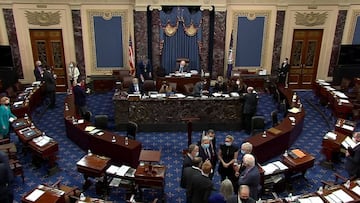Third stimulus check: how many votes does the proposal need to pass?
The Democrats are set to introduce Biden's American Rescue Plan in the House, but how much support is needed for the third stimulus checks to be passed?


On Monday House Democrats will officially propose President Joe Biden’s American Rescue Plan in Congress. The $1.9 trillion stimulus bill has garnered positive approval ratings nationally but the two parties are still some way apart in their estimations of the size of bill required.
One of the key inclusions in the package is a third round of stimulus checks, which will be worth up to $1,400 per person. The stimulus checks are one of the key forms of direct support that Biden’s bill offers, along with extended unemployment benefits and a beefed up child tax credit allowance.
Here's what's in the House Democrats' relief plan:
— Kyle Griffin (@kylegriffin1) February 21, 2021
Stimulus checks
Unemployment assistance
Nutrition assistance
Housing aid
Tax credits for families and workers
Optional paid sick and family leave
Education and child care
Health insurance subsidieshttps://t.co/ejQsEYrhxA
There are hopes that the stimulus checks will begin distribution sometime next month, but the Democrats must secure enough votes in both Houses of Congress for the bill to be signed into law.
Democrats optimistic about their chances of passing the stimulus checks
The American Rescue Plan will first enter the House of Representatives for debate and discussion before being put to a vote. The Democrats hold a healthy majority in the House and should have enough votes to see the bill passed.
The Democrats currently have a ten-seat advantage and require just a simple majority for the package to be passed. Democrat lawmakers are very confident that they will get the bill passed fairly quickly, with California Rep. Ted Lieu announcing on Twitter that he expects the House to pass the American Rescue Plan before the end of the week.
We will pass the American Rescue Plan legislation next week. It’s a very good bill. And it’s what the American people need during this challenging time. https://t.co/xchZvIeC2L
— Ted Lieu (@tedlieu) February 20, 2021
From there it will be sent to the Senate where the Upper House will get a chance to debate the bill. Here the margins a lot finer and many Republicans have already publically declared their intention of voting against the proposal.
A bill usually requires a 60-vote supermajority to be passed in the Senate, a rule that is designed to encourage a more consensus-based style of governance. However the Democrats have already initiated a process known as reconciliation, which would allow them to pass the bill will just a simple majority, as it is classified as a budgetary matter.
The Senate is split 50-50 between the two parties, meaning that the Democrats hold a slim advantage thanks to the tie-breaking vote of Vice President Kamala Harris, thanks to her role as Senate President. Therefore if all Senators vote along party lines the Democrats will have the narrowest of majorities.
Amendments could alter stimulus check eligibility requirements
However it should be noted that the passing of Biden’s relief bill will not necessarily be plain sailing from here. During debates in both Houses there is the opportunity for amendments to be made to the legislation and there is clearly some appetite for changes.
The IRS relies on your most recent tax filing to determine your eligibility for stimulus checks and other assistance. Be sure to file your taxes ASAP, especially if you lost income or work in 2020. https://t.co/Yv84PRbZbs
— Ways & Means Committee (@WaysMeansCmte) February 17, 2021
During a Senate ‘vote-a-rama’ last week, members voted 99-1 in favour of a non-binding amendment which aimed to make the stimulus checks more targeted. The bipartisan proposal came from Democratic Senator Joe Manchin and Republican Senator Susan Collins, who suggested that the new bill should prevent “upper income citizens” from receiving the third stimulus check.
Related stories
The amendment was passed with resounding support but does not include a fixed definition of the phrase “upper income citizens”, suggesting that there could be extensive debates in the coming weeks about the exact eligibility requirements.
In a statement after the vote Collins simply said that she wanted to ensure that the new stimulus checks go to “the struggling families that need it most”.

